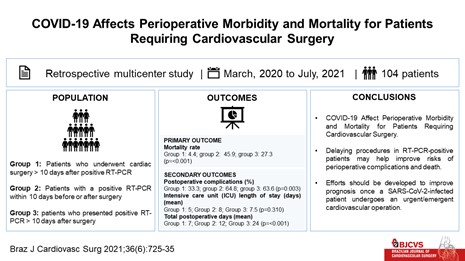Leila Nogueira Ferreira de Barros. Cirurgiã Cardiovascular, Irmandade da Santa Casa de Misericórdia de São Paulo (ISCMSP), São Paulo, São Paulo, Brazil.
Tatiana Farias de Oliveira. Acadêmica de Medicina, Universidade Federal de Alagoas (UFAL), Arapiraca, Alagoas, Brazil.
Karen Amanda Soares de Oliveira. Acadêmica de Medicina, Universidade Federal de Goiás (UFG), Goiânia, Goiás, Brazil.

The COVID-19 pandemic has deeply affected surgical practice. A new study, COVID-19 in the Perioperative Period of Cardiovascular Surgery: the Brazilian Experience, appearing in The Brazilian Journal of Cardiovascular Surgery, involved a Brazilian multicenter team investigating how COVID-19 affects the perioperative period of cardiovascular surgery. This retrospective multicenter cohort study included 104 patients with confirmed COVID-19 in the perioperative period between March 10, 2020, and July 16, 2021. The authors suggest potential explanations for the most unfavorable clinical course of patients requiring cardiovascular surgery, such as the concomitance of conditions such as hypertension, coronary artery disease (CAD), diabetes, and chronic renal disease. However, the authors indicate that the impact of concomitant COVID-19 on patients undergoing cardiovascular procedures remains poorly characterized.
The authors are affiliated with 11 referral centers distributed across four regions of the country: Southeast, Northeast, South, and Central-West. Detailed clinical data from patients who underwent cardiovascular surgery and had confirmed COVID-19 in the perioperative period were gathered. The patients were allocated in 3 groups for posterior analysis (group 1, patients who underwent cardiac surgery > 10 days after the positive RT-PCR test; group 2, patients with a positive RT-PCR test within ten days before or after surgery; group 3, patients who presented with positive RT-PCR test > 10 days after surgery). The primary outcome was defined as mortality rate, and secondary outcomes were postoperative complications, intensive care unit (ICU) length of stay, and days of postoperative hospitalization.
Group 2 showed a high prevalence of surgery performed as an urgent procedure. However, total postoperative hospitalization time was significantly higher in group 3 than in other groups. Postoperative complications and death were significantly higher in groups 2 and 3 – OR=4.45 (95% confidence interval [CI] = 1.64 – 12.87) and OR=3.44 (95% CI = 1.20 – 10.42), respectively. Group 2 had 14 times greater odds of dying than group 1, while group 3 had three times higher risk of death compared to group 1. In the study, the detection of SARS-CoV-2 infection and deferral of surgical intervention proved effective, as seen in group 1 patients, with a delay of 48.4±51.6 days.

Image: Arquivo pessoal.
On the other hand, in group 2 patients, the higher mortality agrees with the shorter mean time between the positive RT-PCR test and the operation date, with a mean of 4.74±3.36 days, ranging from two to eight days, with more urgent/emergency procedures. Grounded in our findings, it is clear the risk of death or severe postoperative complications for COVID-positive patients is lessened as time goes by; a direct relationship of the time interval between the positive RT-PCR and the date of surgery. These results reaffirm the inherent risk related to COVID-19 disease occurring throughout the perioperative period of cardiovascular surgery, associated with higher morbidity and mortality.
Elderly patients (> 60 years), men, hypertensive, with CAD, previous myocardial infarction, smokers, and diabetic were highly prevalent in this series; the same risk factors were demonstrated to predispose a worse prognosis in COVID-192,3,4. It became clear we were dealing with a new scenario. Whereas we should continue providing urgent and elective lifesaving cardiovascular procedures to patients, the threat of COVID-19 affecting outcomes is henceforth a reality. Few reports until now have addressed the impact of COVID-19 in the perioperative period of cardiovascular surgery, and so remains a paucity of information related to surgical procedures and patient outcomes.
That study had as main limitations: number of patients included may restrict the generalization of the outcomes reported and incomplete laboratory testing hinders a more robust investigation of coagulation and inflammatory markers.
Therefore, the authors conclude that delaying procedures in RT-PCR-positive patients may help improve risks of perioperative complications and death, although efforts should be developed to enhance prognosis once a SARS-CoV-2-infected patient undergoes an urgent/emergent cardiovascular operation. Future well-designed studies with larger samples will be required to elucidate the overall impact of COVID-19 in patients requiring cardiovascular surgery procedures.
Read more
DIAS, R.R., et al. Impact of COVID-19 pandemic in a Brazilian high-volume aortic center. Brazilian Journal of Cardiovascular Surgery [online]. 2021, vol. 36, no. 2, pp. 145-149 [viewed 20 January 2022]. https://doi.org/10.21470/1678-9741-2020-0567. Available from: https://cdn.publisher.gn1.link/bjcvs.org/pdf/v36n2a02.pdf
GUAN, W.J., et al. Clinical characteristics of coronavirus disease 2019 in China. New England Journal of Medicine [online]. 2020, vol. 382, no. 18, pp. 1708-1720 [viewed 20 January 2022]. https://doi.org/10.1056/nejmoa2002032. Available from: https://www.nejm.org/doi/10.1056/NEJMoa2002032
GUZIK T.J., et al. COVID-19 and the cardiovascular system: implications for risk assessment, diagnosis, and treatment options. Cardiovascular Research [online]. 2020, vol. 116, no. 10, pp. 1666-1687 [viewed 20 January 2022]. https://doi.org/10.1093/cvr/cvaa106. Available from: https://academic.oup.com/cardiovascres/article/116/10/1666/5826160
KIBBE, M.R. Surgery and COVID-19. JAMA [online]. 2020, vol. 324, no. 12, pp. 1151-1152 [viewed 20 January 2022]. https://doi.org/10.1001/jama.2020.15191. Available from: https://jamanetwork.com/journals/jama/fullarticle/2770860
ROCCO, I.S., et al. Cardiovascular involvement in COVID-19: not to be missed. Brazilian Journal of Cardiovascular Surgery. 2020, vol. 35, no. 4, pp. 530-538 [viewed 20 January 2022]. https://doi.org/10.21470/1678-9741-2020-0224. Available from: https://www.scielo.br/j/rbccv/a/xJGWPysKykLfzWvzpJTzxnQ/?lang=en
SILVEIRA, L.M.V.D., et al. Coronary artery bypass graft during the COVID-19 pandemic. Brazilian Journal of Cardiovascular Surgery [online]. 2020, vol. 35, no. 6, pp. 1003-1006 [viewed 20 January 2022]. https://doi.org/10.21470/1678-9741-2020-0283. Available from: https://cdn.publisher.gn1.link/bjcvs.org/pdf/v35n6a24.pdf
To read the article, access
GOMES, W.J., et al. COVID-19 in the Perioperative Period of Cardiovascular Surgery: the Brazilian Experience. Brazilian Journal of Cardiovascular Surgery [online]. 2021, vol. 36, no. 6, pp. 725-735 [viewed 20 December]. https://doi.org/10.21470/1678-9741-2021-0960.Available from: https://www.scielo.br/j/rbccv/a/Gy9XJDXMb7ZfpmfNMgnhnMJ/
External Link(s)
Walter J. Gomes – ORCID: https://orcid.org/0000-0003-3385-0215
Brazilian Journal of Cardiovascular Surgery – site: https://www.bjcvs.org/
Brazilian Journal of Cardiovascular Surgery: https://www.scielo.br/j/rbccv/
Como citar este post [ISO 690/2010]:


















Recent Comments